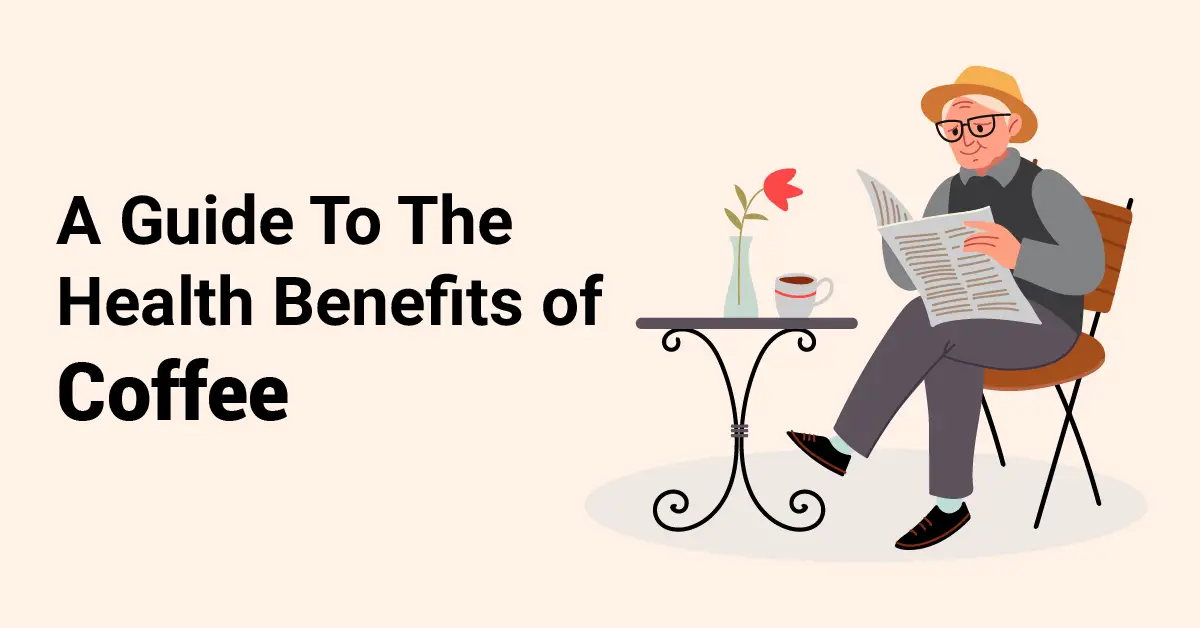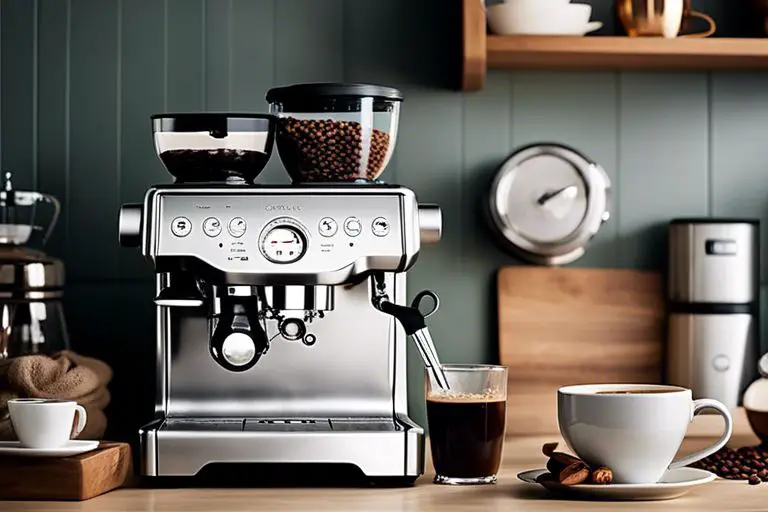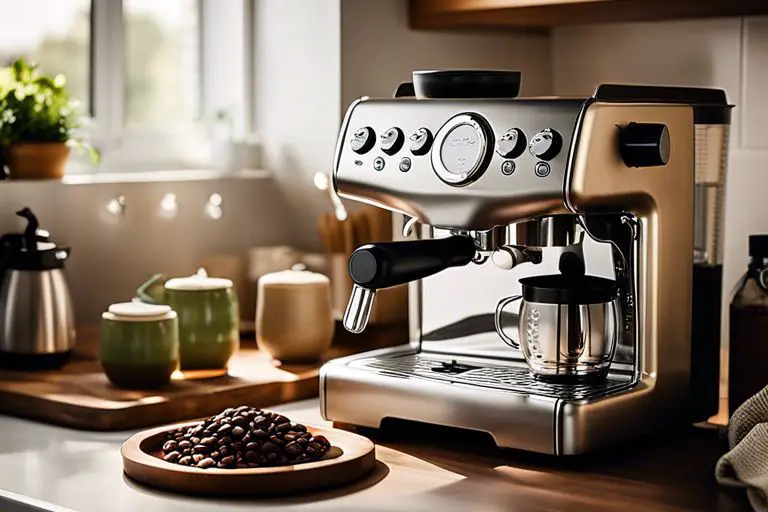Coffee is one of the most popular drinks around the world. Many people drink it at least once a day, if not more often. Most mornings when we wake up, we collectively make ourselves a cup of coffee. For some people, this will be a simple filter coffee. Whereas for others, this will be an incredibly complicated coffee which has been freshly ground and brewed and topped with frothed milk, syrups, and a range of other ingredients.
Whichever method and style you prefer, you’re probably drinking it for the energy kick the caffeine content provides. But are there other benefits to coffee? People have been drinking coffee in some form for an incredibly long time. So it hasn’t always just been the hot bean juice which accelerates us toward our commutes.
Surprisingly, coffee has a range of health benefits. But, like anything healthy, it should still be consumed in moderation. Excess coffee, even decaffeinated coffee, is not good for you. To help you get the most out of this delicious beverage, here is the ultimate guide to the health benefits of coffee.
[toc]
What Type of Coffee to Drink?
When it comes to drinking coffee, lots of people who are conscious of their health avoid it completely. Being sensible about the amount of caffeine you consume is definitely a good idea. But completely restricting an ingredient from your diet (unless for ethical reasons) is unnecessary and unhealthy. Let’s look at some of the main ways of drinking coffee and how they measure up in terms of health.
Black Coffee
Drinking black coffee is often encouraged as it is incredibly low in calories. It is often encouraged as part of intermittent fasting. However, fasting is not recommended for most people. While it can help some people to lose weight, it is still being studied and the benefits are as yet unknown. The diet is also restrictive and not recommended for those recovering from eating disorders.
When we talk about black coffee in this context, we mean tall coffees, not espressos which are considered in more depth below. Black coffee, when diluted with water, is a great way to start your day. Cutting out milk, cream, and sugar from your morning coffee is one way to have a more balanced diet. However, if you do not enjoy drinking black coffee, then there is little harm in adding a little milk and sugar. Or, you can add in something less refined such as honey or agave.
Developing a healthier diet doesn’t mean cutting out anything considered to be “bad”. No food or drink is bad. But, if several times a day you are having a big sugary drink with lots of syrup, artificial colors, chocolate, and whipped cream, then you might need to consider cutting back. Making your food enjoyable is one of the best ways to stick to a healthy and balanced diet.
Espresso
Espresso is the simplest form of coffee. It is the base on which most other coffees are made, especially coffees made with milk. Espresso is made by adding hot water to around 20g of espresso powder (finely ground coffee beans). This makes a very short drink, often called a “shot”. It can be drunk in one or slowly sipped.
Unlike a tall black coffee, espresso is much more concentrated. This also means that there is more caffeine in a shot of espresso than in a tall black coffee. In a tall black coffee, there are around 11g of caffeine. In a shot of espresso, there are around 60g of caffeine. This is a pretty big increase.
Espressos are great for a short sharp kick, whereas a black coffee is better for endurance. When it comes to health, it’s best to limit the number of espressos you drink. Consuming coffee in such a small amount might seem healthier, but you definitely shouldn’t drink the same number of espressos as you would black coffees. Espressos should definitely be kept to a minimum.
Coffee with Milk
One of the reasons people drink black coffee is because they believe milk to be fattening. While it is a good idea to cut down on dairy, both for yourself and the environment, drinking coffee with a little milk won’t be too bad for you. Especially if you do so in moderation.
Drinking a coffee with milk does contain more calories. For example, a black coffee contains around 2 calories, whereas a latte contains around 42. This seems like a huge difference. But, when you factor it into your daily recommended intake of between 2,000 and 2,500 calories, it doesn’t really compare. Even if you drink five lattes a day (which we do not recommend due to the caffeine content), you will barely have reached 10% of your daily calorie intake.
Another reason not to skip the milk in coffee is that it is simply more fun! Coffees without milk, such as espressos or black coffees, are fine and will give you energy. And many people do enjoy the taste. But there are so many more options when it comes to milky coffees. None of which are worth avoiding for the sake of 40 calories.
If you do want to make your coffee healthier, try swapping to a plant-based milk. The best for coffee are oat and coconut. Coconut does have a strong flavor, but oat doesn’t. Almond is another healthy and delicious option, but isn’t great for the environment.
Health Benefits of Drinking Coffee
Coffee is a part of most people’s everyday diet, but few people drink it for the health benefits. So, if you’re considering cutting caffeine, take a look at these great health benefits before you make your decision.
Improves Energy Levels
Everyone knows that caffeine gives you energy. It’s the reason why most of us drink it. Coffee stimulates our nervous system (which is why it’s technically considered to be a drug). This speeds up the messages between your brain and your body. This makes you move faster and generally feel more awake. Too much caffeine can cause you to become jittery and disrupt your focus. But a couple of coffees during the day won’t do any harm.
Boosts Physical Performance
Most people drink coffee to make themselves feel more awake, usually before going to work. But coffee is also a great source of energy before a workout. This is one reason why you might see people in the gym drinking a lot of energy drinks. But these contain far too much caffeine and can be incredibly dangerous.
When making a coffee, you are in control of how much caffeine you consume. Drinking a cup of coffee around an hour before a workout can give you an extra boost and allow you to push yourself further.
Helps Burn Fat
As well as give you the energy to work out, coffee itself can help you to burn fat. Studies have shown that caffeine has the ability to increase your metabolic rate. This means that it can speed up your metabolism, which is responsible for burning fat.
If you ever look at the ingredients of pills and supplements that claim to burn fat, they contain caffeine. This is another reason to avoid these kinds of supplements, diet pills, and slimming teas. They contain caffeine which you can get from a much more enjoyable cup of coffee. (On a side note, they often also include laxatives which make your stomach feel flatter for a little while, but don’t actually help you to lose weight.)
Contains Essential Nutrients
A lot of people consider coffee to only be beneficial in terms of energy, and don’t think that it contains much else. But coffee actually contains some great essential nutrients. These include magnesium, potassium, manganese, vitamin B, and vitamin B5. Drinking a cup of coffee will not, of course, provide you with the entirety of your daily intake of these essential nutrients, but it will go a long way.
May Protect Against Neurodegenerative Disease
This might seem like a bold claim, but studies have shown that caffeine can have amazing effects on the brain. As mentioned above, caffeine increases the speed at which your brain sends messages to your body.
Incredibly, studies have shown that drinking several cups of coffee a day can decrease the chances of developing Alzheimer’s disease by up to 65%. The same studies have also shown that as well as protecting some adults from developing Alzheimer’s, caffeine can even delay the progress of some symptoms of Alzheimer’s in those who already suffer from the disease.
As well as Alzheimer’s, coffee can also reduce the risk of Parkinson’s disease. Parkinson’s is another neurodegenerative disease. Studies suggest that drinking coffee reduces the risk of developing Parkinson’s from anywhere between 32% to 60%.
Reduces Risk of Cancers
This is another huge claim, but it is backed up by evidence. More specifically, coffee can reduce the risk of liver, uterine endometrium, and colorectal cancer. (Coffee has also been shown to protect the liver against illnesses such as fatty liver disease and hepatitis.)
Cancer is one of the most prominent killers in the world, but drinking coffee might just go some way toward warding it off. However, studies are still quite varied and making definitive statements on the connection between coffee and cancer is not yet possible. One reason for this is because, for example, people who smoke and develop lung cancer are also likely to drink coffee.
Coffee has sometimes been reported as a carcinogen, however, the World Health Organization (WHO) does not classify coffee as a carcinogen. This means that there is no evidence that coffee causes cancer. As so many people drink coffee, and cancer is such a prevalent illness, conclusions about the relationship between the two are not yet definitive.
Can Fight Depression
Depression is an illness that can manifest in different ways and can affect people differently. But a study of women drinking four or more cups of coffee a day has shown that drinking coffee can reduce the chances of developing depression by up to 20%.
Great Source of Antioxidants
Amazingly, many people get the majority of their antioxidants from drinking coffee. This is not necessarily a good thing. Drinking coffee is one way of increasing your intake of antioxidants, but it should not be the only nor the main way. This is because coffee does not contain all of the antioxidants that you need.
The best way to consume antioxidants is through eating a variety of fruits and vegetables. As we know, fruits and vegetables should be a big part of your diet. So, while coffee can help add some antioxidants to your diet, it does not mean that you should cut down on consuming fruits and vegetables.
How Much Coffee is Too Much?
Drinking coffee has some excellent health benefits and should not be cut out of your diet entirely. But it should still be consumed in moderation. Drinking too much coffee can have negative effects. It’s not a good idea to consume more than 400mg of caffeine per day. This equates to around four cups of coffee every day. More than this every now and then won’t have detrimental long term effects. So an all-nighter study or work session might be okay sometimes. But it’s not a good idea to do this regularly.
Excess Amounts May Cause Insomnia
One of the main effects of drinking too much coffee is not being able to sleep. Coffee gives you an energy boost, both physically and mentally, which can keep you awake. This is especially true if you drink coffee late in the evening. As a rule, try to limit your caffeine intake after around 4pm. If you work a 9-5 job, try to stop drinking coffee once you have finished work.
If you work a job with different hours or work nights, this can be more difficult. Drinking a lot of coffee (or caffeinated energy drinks) is common for people who work long shifts or work nights. But it’s still a good idea to limit your caffeine intake. Try to get your energy from other things as well. Drinking water can have a huge impact on your energy levels, as can eating food.
If you are feeling a lag in energy during your shift, it’s fine to have a cup of coffee. But, if you already had a coffee an hour or so ago, then it might be a good idea to try something else. Drink a glass of water or eat something with a high sugar or carbohydrate content. This can also give you more energy for longer periods of time.
Should You Drink Coffee When Pregnant?
There are a lot of things that you should avoid when pregnant, coffee being one of them. Some argue that drinking a small amount of coffee isn’t too bad. Just as drinking a small amount of alcohol won’t be too bad. But it’s best to avoid it just in case. Opinions and evidence about what you should and shouldn’t eat and drink when pregnant seems to change every few years. But consuming something which can have such a dramatic effect as coffee isn’t the best idea.
In 2020, the WHO stated that no amount of caffeine is safe for pregnant people to consume. Currently, guidance in the UK, US, and EU advises pregnant people to consume no more than two cups of coffee per day. However, the WHO has now acknowledged studies which suggest that drinking coffee increases the risk of miscarriage, still birth, childhood leukemia, low birth weight, and childhood obesity.
So, the advice varies quite a bit. This means that the choice of whether to drink coffee is up to the person who is pregnant. Being pregnant is an incredibly tiring time, so it’s understandable why people would want to drink coffee. But, if possible, it’s best to find other ways to increase your energy while pregnant.
Should Children Drink Coffee?
As a rule, children should not drink coffee. There is no real reason why they should. As detailed above, coffee does have a wide range of health benefits. But there’s a pretty good chance that children will begin drinking coffee when they become older, so the benefits will begin to be realized then.
Children already have very high energy levels, so they definitely don’t need coffee to keep them going. If your child appears overly tired and lethargic, there might be a specific cause. This could be a medical issue, or they could be overwhelmed with schoolwork or another issue. It’s best to explore this before allowing your child to drink coffee.
The American Association of Pediatrics (AAP) discourages parents from allowing their children to drink coffee. However, there are currently no federal regulations regarding caffeine intake in children. In Canada, it is recommended that children between the ages of 4 and 6 drink no more than half a cup of coffee per day. This recommendation increases a little every two years or so.
In adolescents, the recommendations are different. Caffeine should be limited, but allowing a teenager to drink a cup of coffee every day won’t do any harm. They should not be encouraged to drink coffee excessively, however, they are very likely to be tired from schoolwork, stress, and the general tiring process of puberty.
Encouraging your child to drink coffee might be a way to keep them from drinking energy drinks. Energy drinks have huge amounts of caffeine and are being increasingly consumed by young teenagers. Young teenagers drinking energy drinks has become such an issue that the UK has placed an age limit on energy drinks which bans the sale to those below the age of 16.
Making Coffee Healthier
As shown in detail above, coffee has some amazing health benefits. But, many people alter their coffee in such a way that it can have negative health benefits. This primarily includes adding in large amounts of sugar, syrups, and milk.
If you regularly drink coffee and want to make it even healthier, here are some simple changes you can make.
Don’t Add Sugar or Syrup
This is one of the simplest ways to make your coffee healthier. Especially if you often add refined sugar or syrup to your coffee. Flavored syrups are a very popular addition to coffees, especially for those who enjoy the energy boost but not the taste.
For sugar, try switching to honey or agave. These are still sugars and will add sweetness to your coffee. But they are much healthier forms of sugar.
For syrups, try some sugar-free alternatives, or add in the real ingredients that the syrups are flavored with. This will provide a much more natural and more delicious flavor, as well as cut down on the amount of sugar in your coffee. As syrups are almost entirely made from sugar.
Try Not to Drink Coffee in the Evening
As mentioned above, drinking too much coffee can interfere with your sleep. Try to avoid drinking coffee before going to bed, as this definitely won’t help you to drift off. If you like having a hot drink before bed, try something that will help you to sleep better. This can be a cup of cocoa or a lavender tea. Try to avoid teas with caffeine, such as green tea or English breakfast tea.
Drink Organic, Quality Coffee
If you regularly drink instant coffee, then switching to something fresher is a great idea. This is especially true if you switch to organic coffee. Organic foods are free from pesticides, so are better for your health and for the planet.
To use this kind of coffee, you will need a French press or a coffee machine. Coffee machines can be pretty expensive, but they will be worth it in the long run. If you like the idea of having fresh coffee, you can even invest in a coffee grinder. This will make the freshest possible cup of coffee. You can find many different types of coffee machines which have coffee grinders attached.
Add Cinnamon
Cinnamon is often used to flavor coffee, especially during the fall and winter. (Pumpkin spiced lattes have a lot of cinnamon in them.) But cinnamon actually has some excellent health benefits. If you’re finding that your regular morning coffee isn’t quite doing it, add in some cinnamon before adding in more coffee. Cinnamon can give you an extra boost of energy, without increasing your caffeine intake.
Another similarity to coffee is that cinnamon contains antioxidants. So, adding a little cinnamon to your coffee will increase the number of antioxidants you’re consuming. But, as mentioned above, your main source of antioxidants should still be fruits and vegetables.
Adding cinnamon to your coffee can be a little difficult. This is because it won’t dissolve into the hot coffee, and will instead become gritty and usually sink to the bottom. One way to add cinnamon to coffee is through the filter. Rather than mixing a spoonful into brewed coffee, add it in with the coffee grounds. The water will pass through the coffee and cinnamon. This will essentially make a combined drink of coffee and cinnamon, which will be much more enjoyable.
Switch to Plant-Based Milks
As mentioned above, cutting dairy from your diet is great for both you and the environment. But removing dairy milk doesn’t mean that you have to drink black coffee or espressos. Plant-based milks are a great way to make the taste of coffee much milder and more enjoyable.
While it used to be difficult to find plant-based milks (although soy milk has been around for a long time), the prominence of veganism has caused the number to skyrocket. There are a huge number of plant-based milks available such as oat milk, coconut milk, soy milk, cashew milk, almond milk, pea protein milk, and rice milk.
These milks all have different flavors and consistencies, so it’s worth trying out a few different options. For frothy coffees, oat milk is the best option. It is very thick and creamy, but you can usually find skimmed and semi-skimmed options that are thinner. Or you can even make your own. And don’t worry, oat milk doesn’t taste like oats.
Add Cocoa
We’re not telling you to melt a candy bar into your morning coffee. But adding cocoa powder to a coffee is a great way to give your coffee some added health benefits. Studies have shown that unsweetened cocoa powder and dark chocolate can help to moderate cholesterol levels and might even have cancer-protective properties.
Adding cocoa to your diet can be as easy as melting in some dark chocolate. Or if you don’t have time for this, stir in some cocoa powder. Just make sure to double-check what kind of cocoa powder you’re using. Stick to something unsweetened to make sure that it doesn’t have any refined sugar or artificial sweeteners in it. This includes powders that are intended to be used to make instant hot chocolate. Check out the baking or health food aisle for cocoa powder.
If the chocolate or cocoa powder is too bitter for you, you can always add in some honey or agave afterward to balance it out. This is a much better option as you will be in control of how much sugar you are consuming.
One of the best ways to add cocoa to a coffee is to make a frothy mocha. If you have a milk steamer or hand-held frothing wand, pour some milk into a cup and add a teaspoon or so of cocoa powder. Cocoa powder has a very strong taste so isn’t to everyone’s liking, but you can add as much as you like. Then froth the milk and cocoa powder together. You now have a healthy chocolate milk that you can add to your coffee!
Don’t drink on an empty stomach
If you drink your coffee first thing in the morning, this might be a little difficult. But it’s best to avoid drinking coffee on an empty stomach. This is for a few different reasons. One is due to the acidity of coffee. As coffee is quite acidic, drinking coffee on an empty stomach, especially black coffee, can irritate and damage your stomach lining.
Drinking coffee on an empty stomach can also make you feel nauseous and jittery. Without food in your stomach, your brain will struggle to produce serotonin. Serotonin is the hormone that regulates mood. When you drink coffee on an empty stomach, you can become more anxious and stressed. This will cause a feeling of nauseousness and make you even more jittery than a cup of coffee would normally.
As with any food or drink that will have an impact on your mood or energy levels, it’s best to eat something first. Eating food will help to balance out the stress and anxiety caused by your brain working faster.
Summary
Overall, coffee has a huge range of health benefits. So, if you were considering cutting it out of your diet entirely, there is no real need. That said, as with any food or drink, it’s best to consume coffee in moderation. Drinking more than four or five cups of coffee a day is not good for you and will very likely interfere with your sleep. Coffee can also cause you to need the toilet a lot more, so that’s definitely something to bear in mind.
Although coffee does have health benefits and contain essential nutrients, it cannot be used as a replacement for other food groups. You should still regularly be consuming fruits and vegetables for antioxidants and fiber.
One of the mistakes people often make is to drink a lot of coffee and forget about water. So make sure that you are still getting a good balance between the amount of fresh water you drink and other beverages.
In conclusion, coffee is great. It is good for your brain, your body, and your energy levels. But, as with anything else, try to consume it in moderation.









